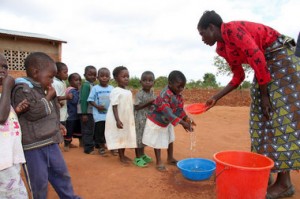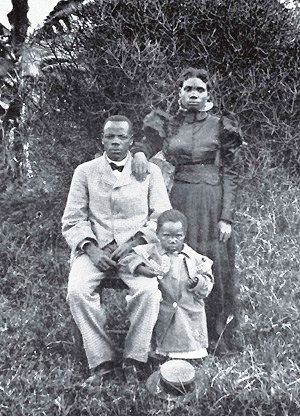 On the outskirts of a Malawi city in southeastern Africa, hands are washed before and after every meal. The host, often helped by her oldest child, offers a basin of water to honor each guest in order of rank, from chiefs down to men, women and orphans, each patiently waiting to scrub, rinse and dry their fingers.
On the outskirts of a Malawi city in southeastern Africa, hands are washed before and after every meal. The host, often helped by her oldest child, offers a basin of water to honor each guest in order of rank, from chiefs down to men, women and orphans, each patiently waiting to scrub, rinse and dry their fingers.
Cleanliness is a revered part of this Malawi village. The water itself, however, is dirty and often tainted with E. coli bacteria, which can make people sick and, in rare cases, cause death.
Justina Msofi, a staff member of the Raleigh Hills-based nonprofit Good Samaritan Malawi, grew up in the country and is stationed there. She suspected that her severe stomach pains were linked to the outhouse on the hill, which seeped sewage into the groundwater.
When Msofi contacted the home office about the drinking water problem, staff knew a Beaverton company that could help.
Puralytics, a clean-tech business headquartered at Northwest Greenbrier Parkway, makes plastic SolarBags that use sunlight to purify water to drinking standards. Two churches, in Portland and Tigard, raised money to donate 200 bags to Good Samaritan Malawi to send to the village.
By this summer, nonprofit staff hope to start delivering bags to the Malawi village of Luwinga.
“We can’t ship the bags,” said Jen Hall, a local program coordinator for the nonprofit, which provides education, training and mentorship for rural villages. “We have to hand-carry them over or they will get lost in the corruption of the country.”
The SolarBags are just a start, until the village can create a sustainable system of its own, Hall said. The nonprofit is working with Malawian community groups and Mzuzu University to educate the villagers about water-borne diseases and how to store and purify water, she added.
The very young and the elderly are the most common faces in Malawi. Roughly 20 years ago, an epidemic of HIV infections swept through much of the young adult and middle-aged generation, the country’s main workforce. About 12 percent of the country’s population of 13 million people is infected with HIV.
Widows were left behind to cook, work, teach and raise families, while despondent, unemployed men spent what little their families earned on alcohol and lay in the park, wasted on drink, Hall said. Orphaned teenage girls thought of suicide, or sold their bodies for money.
Msofi refused to become one of those girls. She raised herself, her siblings and her cousins, and earned good grades. She later went to vocational and counseling schools in Mzuzu, a northern city of about 100,000 people, and in Kenya and the United States.
The nonprofit’s assistant national director, Msofi returned to her village to mentor other women, oversee a nursery school and develop other programs to help her community. She’ll be one of the leaders for the SolarBag project.
GS.71WATR103a.jpgView full size
Jill Hartzell, director of the nonprofit in Oregon, said once people receive the SolarBags, they will attend a weekly community meeting for six months.
“We’re going to first train the leaders on the concept of clean water and necessity to understand the problem and share that with their community,” Hartzell said. Leaders can then share their knowledge, she added.
Teenage girls at a school in Bolero, Malawi, will have the chance to learn about the value of clean water during their curriculum on permaculture. After they graduate, the girls receive a mico-business loan and apply what they learned in the backyards of village widows.
Reuben Moyo, a nurse who runs a pediatric ward at Nkhata Bay Hospital, will be yet another advocate for water training when families come in for health checkups, nonprofit staff said.
Mark Owen, CEO of Puralytics, said this is his company’s first project in Malawi. Puralytics is working with government groups, nonprofits, religious groups and other businesses to provide SolarBags to more than a dozen developing countries, he said.
Even on a cloudy day, the sun’s rays can activate nanotechnology in a SolarBag’s lining to break down and destroy toxins and bacteria within four hours, without leaving any waste. A SolarBag, which retails for $80 online, is reusable and can purify up to three liters of water at a time.
Last Christmas, Owen’s friends at Greater Portland Bible Church and Potter’s Hands Christian Church in Tigard were looking for ways to demonstrate generosity during the holiday season. Greater Portland raised $5,800 for the SolarBag project, and a youth group from Potter’s Hands Christian raised money for another 30 bags.
Despite the contamination of the water, villagers congregate around wells and pools of groundwater to strengthen their sense of community.
“Yes, it’s very dirty, but it’s also an opportunity for community,” Hall said. “You know you’re going to find friends there, especially for the girls.”



.jpeg&w=60&q=100&h=60)







